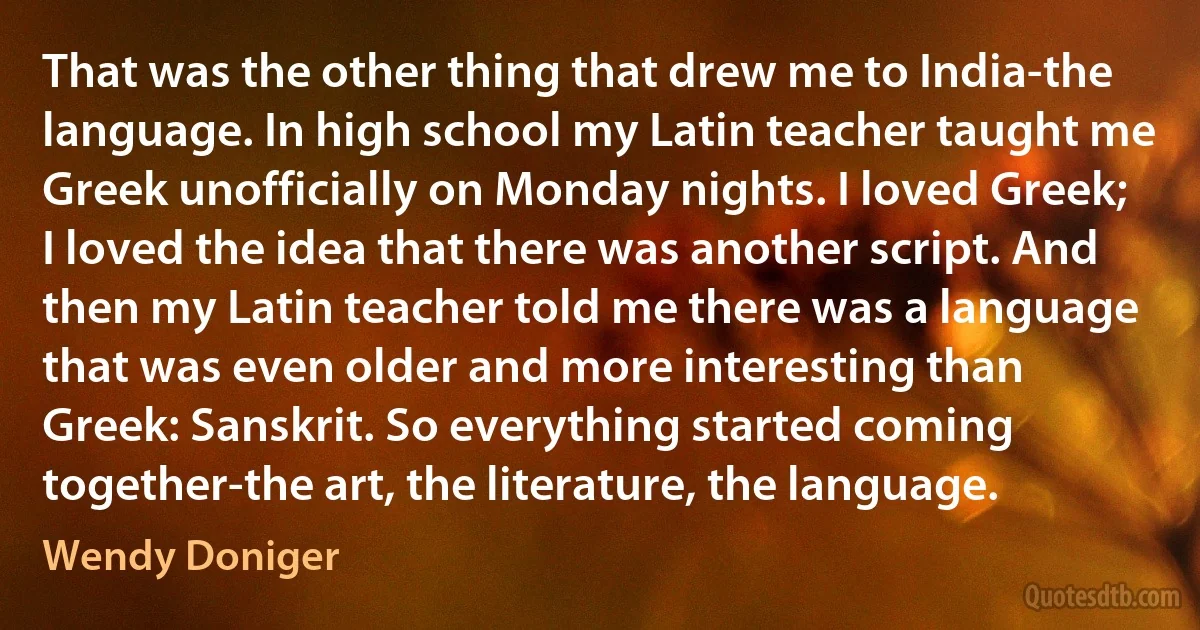Sanskrit Quotes - page 3
We believe that the idea underlying this integral concept of statistics finds adequate expression in the ancient Indian work Sankhya in Sanskrit the usual meaning is ‘number‘, but the original root meaning was ‘determinate knowledge' in the Atharva Veda a derivative from Sankhyata occurs both in the sense of ‘well-known‘ as well as ‘numbered'. The lexicons give both meanings. Amarakosa gives Sankhya – vicarana (deliberation, analysis) as well as ‘number'; also Sankhyavan.

Prasanta Chandra Mahalanobis
It is imperative, from the Indian side, that the powers that be in Indian universities must recognize the need for historical Indo-European linguistics in their humanities departments if they are to make significant contributions to the protohistory of their subcontinent. Indo-European studies should, if anything, be an Indian forte, not exclusively a European one; many Indian scholars have a distinct head start due to their advanced knowledge of Sanskrit, which still plays a fundamental and extensive role in this field. In particular, it is simply unacceptable that research into substratum influence in Sanskrit texts has primarily been the preserve of a dozen or so Western scholars, however qualified.

Edwin Bryant
Tibet preserved as best as it could, what India was no longer in a position to do. For example, 4000 books belonging to the Sanskrit, Pali and Prakrit literature were translated into Tibetan language. Today, about 3800 of them are no longer even known in India. They were so completely destroyed. The work of destruction was so complete. Today much of old India is found in neighbouring countries like Tibet and Siam and Cambodia; and India's old past history cannot be reconstructed except with their aid.

Ram Swarup
The word "Sanskrit" means "prepared, pure, refined or perfect". It was not for nothing that it was called the "devavani" (language of the Gods). It has an outstanding place in our culture and indeed was recognized as a language of rare sublimity by the whole world. Sanskrit was the language of our philosophers, our scientists, our mathematicians, our poets and playwrights, our grammarians, our jurists, etc. In grammar, Panini and Patanjali (authors of Ashtadhyayi and the Mahabhashya) have no equals in the world; in astronomy and mathematics the works of Aryabhatta, Brahmagupta and Bhaskar opened up new frontiers for mankind, as did the works of Charak and Sushrut in medicine.

Markandey Katju
He sidesteps the rise in the funding of Persian and Arabic by the secular Indian government and by foreign sponsors, and the concurrent dramatic decline in Sanskrit funding. He does not expose the downsizing and dismantling of the institutions, both formal and informal, on which Sanskrit and sanskriti have traditionally thrived. Pollock is careful not to implicate the non-Hindu forces that have wreaked havoc against Sanskrit.

Rajiv Malhotra
Although he sees this process as politically driven, Pollock does acknowledge there were no conquering Sanskrit legions that caused Sanskritization, unlike the coercive Romanization which followed Roman military legions. Nor was there a central church-like religious institution and hence no evangelism that could have Sanskritized through religious conversion. He admits that the notion of the Sanskrit cosmopolis does not fit the Western notion of an empire.

Rajiv Malhotra
I wish to also point out that Dr Ambedkar, the pioneering Dalit leader, had worked zealously to promote Sanskrit. A dispatch of the Press Trust of India dated 10 September 1949 states that he was among those who sponsored an amendment making Sanskrit, instead of Hindi, the official language of the Indian Union.

Rajiv Malhotra
Thus, Grünendahl has noted Pollock's tendency to develop broad narratives without any supporting evidence. Moreover, he draws attention to Pollock's messianism in promoting American scholarship...., casting doubt on Pollock's attempt to analyse Sanskrit objectively. He raises the pertinent question as to whether Pollock is providing the intellectual foundations for America's 'New Raj', to replace the dead British Raj - i.e., whether American imperialism is replacing the dead British imperialism.

Rajiv Malhotra
It seems obvious that Pollock is committed to the Marxist theory linking literary works and political power. He wants to deploy it as his lens for analysing how the aesthetic use of languages in India became interwoven into the fabric of politics. At a deeper level, beyond the aesthetic and political usage of Sanskrit, he finds that old Marxist demon: theology. For him, as for most Marxist-oriented scholars, all forms of spirituality/transcendence are, in effect, irrational, deformed and mystified ways of thinking....

Rajiv Malhotra
Many similar views were also expressed in the Sanskrit Commission Report written under the Nehru government in the 1950s. That report declares: "The State in ancient India, it must be specially pointed out, freely patronised education establishments, but left them to develop on their own lines, without any interference or control. It says that until the British disruption, the salient features of our traditional education included: 'oral instruction, insistence on moral discipline and character-building, freedom in the matter of the courses of study, absence of extraneous control...' ... We can never insist too strongly on this signal fact that Sanskrit has been the Great Unifying Force of India, and that India with its nearly 400 millions of people is One Country, and not half a dozen or more countries, only because of Sanskrit.'

Rajiv Malhotra
I do not contest that this top-down instrumental use for pure politics was being made to some degree; but to reduce the entire process of cultural evolution to a matter of politics betrays a profound misunderstanding. This view disregards the intrinsic appeal of the Sanskrit tradition, including for non-elites, and the various roles it played in the cultures it touched. In particular, to dismiss the entire symbolic discourse of Sanskrit as 'mystifying' is to apply a reductive Marxism that cannot account for sacredness in the lives of people.

Rajiv Malhotra
The word "Aryan” comes from the Sanskrit meaning "noble ones.” Secondly, every word we speak and every action we take sets an example for someone and influences someone. There is absolutely nothing noble about drug use or drunkenness. It does not advance or aid yourself, your family or your race. In fact, almost inevitably it makes a person a burden to family and friends.

David Lane (white nationalist)
The first part of South Asia to be cleansed of Hinduism was Afghanistan. The 10 th century saw a life-and-death struggle there between Muslim invaders and the local Hindu population and dynasty. In this case, the replacement was not just religious, of Hindus by Muslims, but also ethnic, viz. of Indo-Aryans by Iranians. The fact of an at least partial physical replacement of the native population by invaders is attested by the linguistic shift. Until then, in much of the present-day Pashtu-speaking region of Pakistan and Afghanistan, an Indo-Aryan Prakrit was spoken (remember how the Sanskrit grammarian Panini was a native of Peshawar). It was replaced with Pashtu, an Iranian language.

Koenraad Elst
When Europeans first thought up the AIT around 1820 (after having espoused the OIT for half a century) and then took it to India, many Indians simply denied that anyone had come from anywhere, and pointed out correctly that nothing amounting to what is known as the Aryan invasion (with the importation of Sanskrit from outside) is described in scripture... Both Sanskrit professor Nicholas Kazanas (Athens) and myself have many anecdotes up our sleeves of how any Homeland debate in which the OIT figures, is being stonewalled by AIT-leaning linguists... Then again, this genocide does exist, viz. as part of the Dravidianist mythology, especially in its missionary version, because of overcompensation for the real genocide of natives in the Americas that accompanied their Christianization. (Ch. 30)

Koenraad Elst
Sanskrit has many words for the horse: aśva, arvant or arvvā, haya, vājin, sapti, turanga, kilvī, pracelaka and gho ṭ aka, to name the most prominent among them. And yet, the Dravidian languages show no trace of having borrowed any of these words; they have their own words kudirai, parī and mā [...] The Santali and Mundari languages, however, have preserved the original Kol- Munda word sādom. Not only has no linguist ever claimed that the Dravidian and Kol-Munda words for horse‘ are borrowed from 'Aryan‘ words, but in fact some linguists have even sought to establish that Sanskrit gho ṭ aka, from which all modern Indo-Aryan words are derived, is borrowed from the Kol-Munda languages.

Shrikant Talageri
Indian culture being the greatest and richest is not a narrow or chauvinistic idea; it is a demonstrable fact. It would be chauvinistic if it acquired an imperialist tinge: that other cultures are inferior and Indian culture must dominate over or replace them. In fact, I am opposed to even internal cultural imperialism. The idea that Vedic or Sanskrit culture represents Indian culture and that other cultures within India are its subcultures and must be incorporated into it, is wrong.... all other cultures native to this land: the culture of the Andaman islanders, the Nagas, the Mundas, the tribes of Arunachal Pradesh, etc. are all Indian in their own right. They don't have to be – and should not be – Sanskritised to make them Indian.

Shrikant Talageri
I walk up the stairs to my fourth-floor apartment, all alone. I let myself into my tiny little studio, all alone. I shut the door behind me. Another early bedtime in Rome. Another long night's sleep ahead of me, with nobody and nothing in my bed except a pile of Italian phrase books and dictionaries.
I am alone, I am all alone, I am completely alone.
Grasping this reality, I let go of my bag, drop to my knees, and press my forehead against the floor. There I offer up to the universe a fervent prayer of thanks.
First in English.
Then in Italian.
And then - just to get the point across - in Sanskrit.
And since I am already down there in supplication on the floor, let me hold that position as I reach back in time three years earlier to the moment where this entire story began - a moment that also found me in this exact same posture: on my knees, on a floor, praying.

Elizabeth Gilbert



